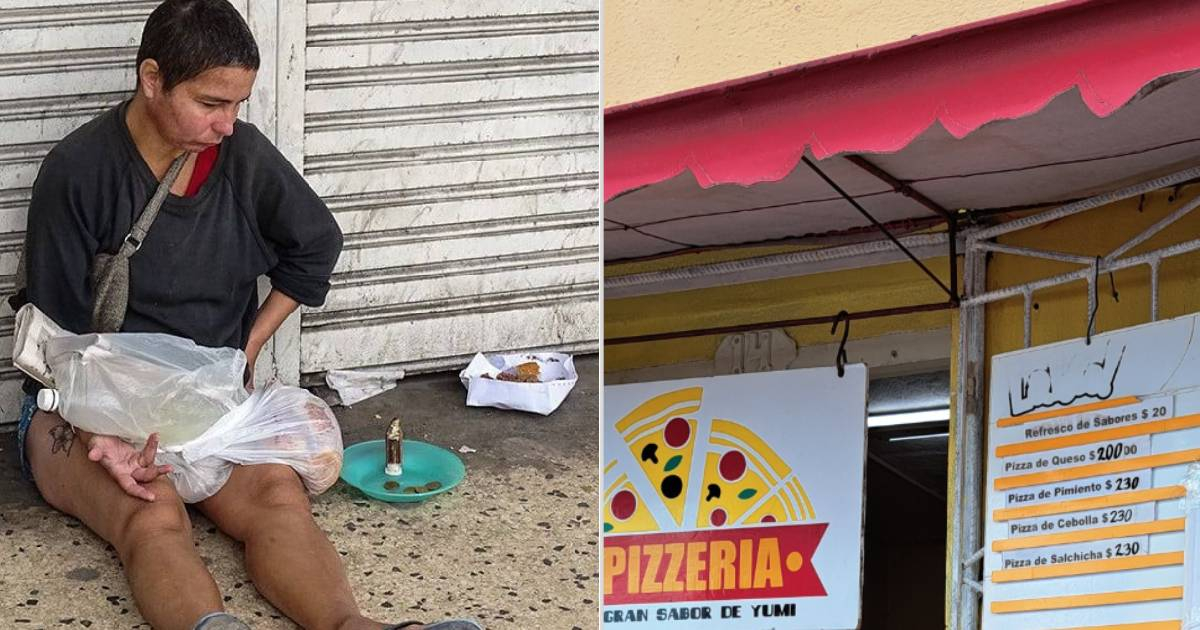
Related videos:
In times when the economic crisis forces thousands of Cubans to struggle daily to put a meal on the table, a small yet powerful gesture of empathy and generosity has touched the community of Santa Clara, Villa Clara.
A pizzeria located on Plácido Street, between Independencia and Céspedes, has decided to do something quite unusual and deeply humane: to offer bambinas -small pizzas- completely free for homeless individuals. A sign placed in view of everyone, alongside the establishment's regular menu, humbly announces this.
User Yamila García shared the gesture in the group Facebook Santa Clara in Snapshots: “A work of love and charity in these difficult times, where empathy and compassion have become elusive acts,” she wrote.
“Thank you for thinking of the less fortunate,” added García, summing up the feelings of many who have seen in this act a spark of hope amid so many hardships.
In a city where scarcity, exorbitant prices, and necessity dictate the routine of many families, this gesture has not gone unnoticed. Several internet users have expressed gratitude for the business owner's commitment to those who are in greatest need.
A display of humanity in the midst of scarcity
In today's Cuba, marked by power outages, inflation, shortages, and insufficient wages, every meal is a challenge. It is common to see elderly people, single mothers, or homeless individuals who struggle to secure even one hot meal a day.
That is why the gesture of this pizzeria goes beyond a one-time action: it represents a firm stance against indifference. In a country where solidarity often remains only in official discourse, initiatives like this demonstrate that compassion still has a place in the hearts of some Cubans.
This simple yet profoundly human act restores a measure of dignity to those who have been forgotten by the system, while at the same time reminding us that true greatness lies not in what one possesses, but in what one shares.
The state media blames drugs for the increase in homeless people on the streets of Cuba
Just a few days ago, the Cuban regime, through its media machinery, once again attempted to divert attention from a problem that overwhelms the streets of the country: the growing population of homeless individuals.
A report broadcast by Canal Caribe, titled "Actions to Prevent Wandering Behaviors in Cuba," points to addiction as the primary culprit, while avoiding mention of the deep structural roots and the state's failure to address the crisis.
The official journalist Talia González acknowledges that the images of beggars in the streets of Cuba are painful and concerning. However, as the report progresses, the responsibility shifts from the economic crisis – which is barely mentioned in passing – to alleged poor individual choices and family problems.
Dr. Miriam Brito, director of the Psychiatric Hospital of Havana, points to three causes: elderly people abandoned by relatives who emigrate, Cubans who lose everything after failed attempts to leave the country, and individuals who end up on the streets due to addictions. It's a convenient narrative for the regime, which avoids its inability to provide real solutions.
Belkis Delgado, director of Social Prevention, admitted what every Cuban already knows: there is no effective intersectoral collaboration. The government has failed to reintegrate these individuals into professional life, to return them to their families, or to protect dependent elderly individuals.
The figures are not provided, but the phenomenon is growing. More and more people are seen begging on the streets of an island that the regime continues to promote as a paradise. The report, far from accepting responsibility, concludes by recalling the laws that impose fines on those who roam or force others to do so, as if repression were the solution.
The State acknowledges that it lacks the resources to assist everyone. The economic crisis, rampant inflation, miserable wages, shortages of medicine and food, mass exodus, and social exclusion are directly the responsibility of a failed system, but the regime prefers to blame drugs rather than recognize its collapse.
The reality is impossible to hide. The streets of Cuba are filled with beggars, while the government searches for excuses and empty speeches. Politics has not been able to solve problems that only freedom, prosperity, and true change could address.
Frequently Asked Questions about Solidarity Initiatives and the Crisis in Cuba
What is the supportive gesture of the pizzeria in Santa Clara?
The pizzeria in Santa Clara made a supportive gesture by offering bambinas, which are small pizzas, free of charge to homeless individuals. This act is a demonstration of empathy in a context of economic crisis in Cuba.
How does the community react to this type of solidarity actions?
The community has reacted very positively and gratefully to these acts of solidarity. These gestures are seen as sparks of hope amidst the difficulties faced by Cubans every day.
What does the Cuban regime say about the situation of people on the streets?
The Cuban regime, through its official media, has pointed to addictions and personal decisions as the main causes of the increase in homeless individuals. This way, they avoid taking responsibility for the economic and social crisis that the country is facing.
What impact does the economic crisis have on the Cuban population?
The economic crisis in Cuba has led to a significant increase in the number of people experiencing homelessness and a widespread scarcity of basic resources. This has created a greater reliance on community solidarity to meet essential needs such as food and personal care.
Filed under: